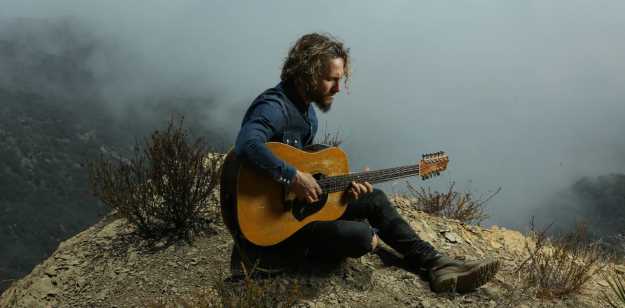|
Taken from Calgary Herald (June 28, 2018)
Australia's John Butler looks inward, grows outward with upcoming album
by Eric Volmers

John Butler from the John Butler Trio. Courtesy, Courtesy, James Minchin III |
Given the amount of time John Butler spends touring, it's hardly surprising that he frequently finds himself on the road eager to play new music that has yet to be introduced to the masses.
In fact, the seemingly leisurely pace in which the Australian singer-songwriter and guitarist releases records as leader of the John Butler Trio is at least partly due to his hectic touring schedule. Still, even by his standards, the four-year gap between 2014's Flesh & Blood and the upcoming seventh album, Home, has been lengthy.
So, as a musician, there is a bit of a pent-up desire to play the new material that has been alluringly waiting in the wings for some time now. But Butler also realizes that playing unknown material can be a bit of a gamble.
"I always find it a little nerve-wracking," admits Butler, on the line during a tour stop in Portland, Ore.
"I know when I go to a concert, I want to hear the songs I know. I guess I've never been a hard, hard, hardcore fan of any band, where I'm waiting out for obscurities or something new and fresh. When I go to a Stevie Wonder concert, I want to hear Superstition. So I realize it takes a lot of patience on (the fans') behalf. But they have been getting really good responses."
So fans can expect the unexpected when the John Butler Trio hits MacEwan Hall on Saturday, June 30. The first surprise is that the trio is now a quintet, with Butler bolstering the ranks for the first time in the band's history by adding two additional percussionists. In part, it's to help capture some of the more complex layers that he produced on the record. The bigger band has also added new depth to old favourites, whether it be the folk-blues grooves of Betterman or spartan soul-funk of Zebra.
Not that the trio format has ever seemed particularly limiting for Butler. Since bursting onto the scene in Australia in the late 1990s, the John Butler Trio earned a reputation as musicians' musicians, a supple outfit that can veer from the spidery, 12-minute fingerpicked instrumental Ocean, to the alt-rock drama of Revolution in the blink of an eye. (Just don't call them a jam band, a label Butler apparently despises.)
But, as is often the case with the artistically restless musician, Butler had a desire to cleanse the palate for Home, both sonically and lyrically. This is why the album, which hits stores in the fall, had such a long gestation period. A self-described Luddite, Butler says the increasingly user-friendly aspects of the home-recording program GarageBand allowed for far more solitary pre-production work than on past albums. Specifically, Butler was able to experiment with hip-hop flavoured beats.
"I essentially use very old, roots traditions of fingerpicking," he says. "But I hear it over hip-hop beats, I don't hear it over traditional country or folk percussion. I never have. All the percussion and rhythm I like is hip-hop."
Still, Butler wanted to make sure the record remained based in songs and storytelling, not just a collection of homemade beats and synths.
"It was about (getting) my love of big beats together with my love of songwriting and telling a story and the way I play guitar and the way I write music instrumentally," he says. "It was a nice journey. It wasn't always an easy journey, to find how all these elements could live happily together. I wasn't interested in making an album that sounded really intellectual - 'Oh, look what I'm doing, I'm playing that bit over this bit over that bit and isn't that clever?' I wanted them to sound at home together."
Similarly, the new songs' lyrics arose from a good deal of "soul-searching," which also proved to be a time-consuming process. Butler moved back to the country in his native Australia where he got to "say hello to bits of myself that I thought I'd lost in the fray." It found him downplaying his more overtly political side and looking inward.
"Some of them are really simple love songs and some are little more existential yearnings," he says. "There's songs like Faith, where I'm (asking) what it is I believe in. It is God? Does God see me? I believe in something, but what is it? There's some pretty deep numbers on this album. The album is called Home and, in a lot of ways, it's a return to the self in a deeper way."
Which makes it quite different than the band's recent standalone single, Bully, a politically charged and terrifically tuneful broadside on politicians and corporations which Butler sees as undermining communities and wreaking havoc on the environment. While the lyrics are vague, Butler says it was specifically inspired by the rise of fracking in Australian communities, the controversial mining process where liquid is injected at high pressure into subterranean rocks to extract oil or gas.
It's an angry song, inspired by fiery political performers such as Woody Guthrie, Midnight Oil, Rage Against the Machine and Public Enemy, he says.
Whether Butler is finished with this sort of on-the-nose political writing remains to be seen. But he says the new material does feel like a new chapter, where he was more interested in finding a place where inner struggle and outside conflict intersect.
"I find myself in a more existential, deeply philosophical point," he says. "The world is pretty divided and no one sees eye to eye, no one knows what to believe in. I just had to turn inside and find some faith on my own and some direction that was more of a spiritual place. That seems like the new front."
The John Butler Trio plays MacEwan Hall on June 30.
|